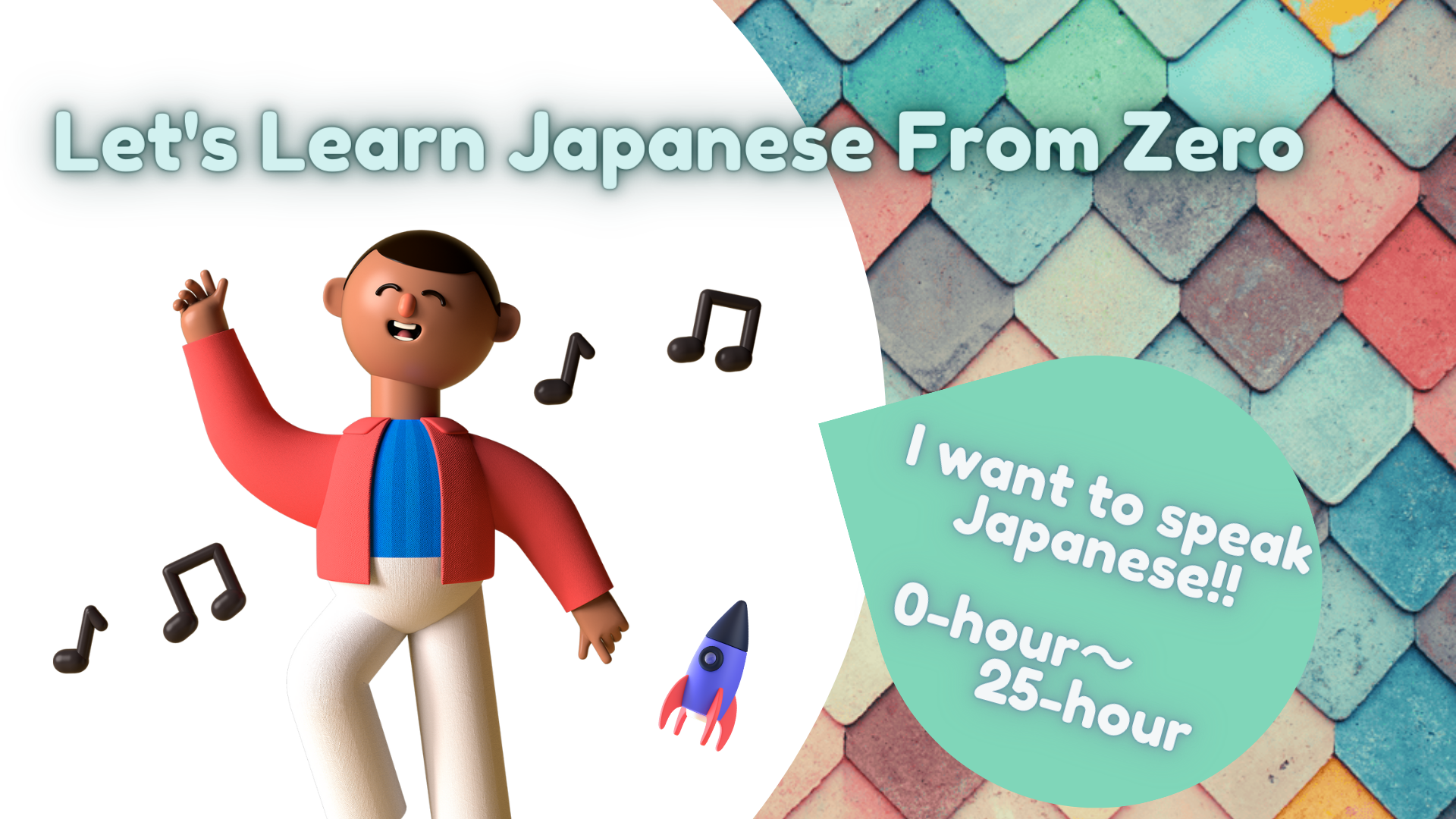
Here is the Playlist of my project “Let’s Learn Japanese From Zero Playlist.”
My friend, Dan, had initially zero knowledge of the Japanese language.
She is now learning the Japanese language with me, Azumi not by studying Grammar but by speaking it. I provide natural input to Dan while we have the online sessions for 2 hours per week. We aim for 100 hours with natural comprehensive input.
- Speak Japanese more than 90%
- Do not learn Grammar
- 60-min session
- Both ask as many questions as possible
The initial videos might not have much clearer sounds or images, but I have been working on improving them. If you cannot bear that, please start from the middle of the videos! We keep trying to improve our content!! And, we are so happy you are reading this page now!!
Here are links to the page after 25 hours and the page after 50 hours.
- language characteristics, articulation, XはY, useful phrases
- Articulation らrow &ん, Greetings, XはYじゃない, Numbers1-6
- Attention to Japanese Fonts, Does [は] sound “ha” or “wa”?
- なにじん ですか?Numbers: なんじ ですか?なんぷん ですか?
- なんじ? Xの つぎは なんじ?なんぷん? いってきます! ただいま!
- Verb, なんじにVerb? Verb てください, More Greetings
- もparticle, how to call family member, にparticle, をparticle
- Casual & polite question, request:ください, これ,それ/この,その
- Xをとって、この/その/あの/どの、ここ/そこ/あそこ/どこ
- Frequency, Counter “いくつ,” にparticle, とparticle, をparticle
- 10H-assesment, いくつ?, いくら?,
- なんじになにをする?, それをXつでいくら?, いく・かえる
- いる・いく・くる, Frequency
- ここ/そこ/あそこに [place]がある, よくVerbする?いくら?
- Xが [place]に ある, でparticle+Verb
- なにがほしい?, Xが [place]に いる
- [place]に いる/ある,【Ending particles】 ねparticle, よparticle, かparticle
- のparticle, ねparticle, よparticle, もparticle, Casual⇔Formal Japanese
- Invitation Verb ない?Verbませんか?, いadjective: ほしい/ほしくない
- Casual Present だ Past だった, Formal Present ます Past ました
- After 20H assesment, なんようび, ない・なかったconjugation
- とparticle, relation between ない and いadjective, なadjective conjugation
- たくさん、Counting modern and traditional ways、Xは Yが なadjective
- Family Member Nouns, てform: how to make a request
- てform: two activities, いadjective’s てform, てform permission, Long Vowel Writing Rule
language characteristics, articulation, XはY, useful phrases
vol. 0: spoken in English
Japanese language characteristic: not stress-timed, but the syllable-timed language
vol.1-1
- X は Y です
- Noun1 の Noun2
- long vowel of スマートフォン
- small 「tsuつ」:creates the clipping sound
- kore/これ:this
- sumahtofon/スマートフォン: smartphone
- megane/めがね:glasses
- watashi/わたし:I
- nani/なに:what
- koppu/コップ:cup
vol.1-2
- how to use ‘you’ in Japanese language
- わたしは Xです
- how to make a question
- double consonant = small 「tsuつ」
- long vowel 「uう」
- anata/あなた: you
- wakatta/わかった?Do you understand?
- wakaranaiわからない I don’t understand
- ohayoh/おはよう: Good morning
Articulation らrow &ん, Greetings, XはYじゃない, Numbers1-6
vol. 2-1
- how to articulate 「raらりるれろ」
- XはYじゃない
- asa/あさ:morning
- yoru/よる:night
- nihonjin/にほんじん:Japanese
- amerikajin/あめりかじん:American
- chuhgokujin/ちゅうごくじん:Chinese
- nani/なに:what
- iine/いいね Good!
- soh/そう Right!
- yattah/やったー Woo-hoo!
- chotto matte/ちょっとまって Wait a sec!
- moh ichido/もういちど One more time
vol. 2-2
- how to articulate 「nん」
- XはYじゃない
- how to articulate small「tsuつ」
- how to articulate 「たrow」 and 「だrow」
- hiruひる:daytime
- gomen/ごめん:Sorry!
- ohayoh/おはよう: Good morning
vol. 2-3
- Greetings
- when to use 「ちゃん」
- shitsumonsしつもん:question
- itsuいつ:when
- kon nichiwa/こんにちは:Hi, hello
- kon banwa/こんばんは:Good evening
vol. 2-4
- Numbers
- suhji/すうじ:number
- ichi/いち:one
- ni/に:two
- san/さん:three
- shi, yon/し、よん:four
- go/ご:five
- roku/ろく:six
- Arigatoh/ありがとう:Thank you
Attention to Japanese Fonts, Does [は] sound “ha” or “wa”?
vol. 3-1
- Please be aware of difference between Fonts in order to let your handwriting understood.
- Everyday phrases
- X は Y です
- How to use さん? You dont’ use さん for yourself
- itu/いつ:when
- yuhgata/ゆうがた:early evening
- yoru/よる:night
- gomen/ごめん:Sorry!
- yattah!/やったー:Yay!
vol. 3-2
- How to use あなた? ➜You only use あなた for a stranger.
- Who’s smartphone? 誰のXですか?
- Noun1 の Noun2
- これはなに?(casual) これはなんですか?(polite)
- さん and ちゃん will not follow yourself. They are supposed to use for show your respect toward others.
- sumahtofon/スマートフォン: smartphone
- dare/だれ:who
- anata/あなた:you
- pen/ペン: pen
- Who’s X is this? 誰のXですか?
- daijohbu/だいじょうぶ:It’s alright
- wakatta/わかった?:Do you understand?
- Chotto matte/ちょっとまって:Wait a sec
vol. 3-3
- What’s like ゆうがた? ➜While sun is going down. After sun is down, it is よる.
- how to articulate smallつ
- Does [は] sound “ha” or “wa”? ➜When は functions as a particle, it sounds “wa.”
- I don’t hear です as “desu” but “des”!
- なし
- なし
vol. 3-4
- Numbers
- nana/なな:seven
- hachi/はち:eight
- kyuh/きゅう:nine
- kikoeru/きこえる?:Can you hear me?
- kikoenai/きこえない:I cannot hear you.
- wakarimashita/わかりました:I understood.
なにじん ですか?Numbers: なんじ ですか?なんぷん ですか?
vol. 4-1
- XはY
- Xはなにじん?
- itsu/いつ:when
- nani/なに:what
- dare/だれ:who
- watashi/わたし:I
- anata/あなた:you
- chuhgokujin/ちゅうごくじん:Chinese
- nihonjin/にほんじん:Japanese
- renshuh/れんしゅう:practice
- tatoeba/たとえば:for example
- amerikajin/あめりかじん:American
- koronbiajin/ころんびあじん:Colombian
- daijohbu/だいじょうぶ:be alright
vol. 4-2
- casual question XはY➚?
- formal question XはY「ですか」?
- ima/いま:now
- shitsumon/しつもん:question
- kikoeru/きこえる?:Can you hear me?
- shitsumon des/しつもんです:I have a question
- shitsumon shite/しつもんして:Ask me a question
vol. 4-3
- Xはなにじん?
- Numbers
- 1からかぞえて
- 10から19までかぞえて
- 10, 20, 30, …
- What time?
- dare/だれ: who
- anata/あなた: you
- kara/から: from
- sugoi/すごい: great
- jikan/ じかん: time
- ji/じ: hour
- fun/ふん: minute
- nani jin desu ka/なにじんですか?: which country are you originally from?
- kazoete/ かぞえて: Please count.
- nanji desu ka/なんじですか?what time?
vol. 4-4
- ask hours and minutes
- counter 分: いっぷん〜じゅっぷん
- です[desu or des?] : the last vowel is missing.
- jikan/ じかん: time
- ji/じ: hour
- fun/ふん: minute
- nanji desu ka/なんじですか?what time?
- wakaranai/わからない: I don’t understand
- shitsumon shite/しつもんして:Ask me a question
なんじ? Xの つぎは なんじ?なんぷん? いってきます! ただいま!
vol. 5-1
- ジュリアンさんは何人ですか?
- kyuhkei/きゅうけい: break
- oshii/おしい: almost
- nani/なに: what
- tomodachi/ともだち: friend
- oboeteru/おぼえてる?:Do you remember it?
- oboete nai/おぼえてない: I don’t remember
- oboete/おぼえて: Please remember it.
- daijohbu/だいじょうぶ: Are you alright?(question) I’m fine.(affirmative)
- chotto matte/ちょっとまって: Wait a sec.
- kikoeru/きこえる?: Can you hear me?
vol. 5-2
- Numbers, count after 11
- Time: なんじ?
- suuji/すうじ:number
- kara/から: from
- made/まで: to
- shita/した: down
- ue/うえ: up
- gozen/ごぜん: a.m.
- gogo/ごご: p.m.
- tsugi/つぎ: next
- kazoete/かぞえて:Please count.
- X, だいじょうぶ? : Are you okay with X?
vol. 5-3
- 1じ、2じ、3じ…
- Xの つぎは なんじ?
- zenbu/ぜんぶ: everything
- tsugi/つぎ: next
- muzukashii/むずかしい: difficult
- oboeteru/おぼえてる?:Do you remember it?
- mou ichido/もういちど: one more time
vol. 5-4
- Xのじかんは なんじですか?
- Xの あいさつは なに?
- いってきます
- ただいま
- いってらっしゃい
- itsu/いつ: when
- ima/いま: now
- itte kimas/いってきます:I’m leaving.
- tada ima/ただいま: I’m home.
- itte rasshai/いってらっしゃい: response of いってきます
Verb, なんじにVerb? Verb てください, More Greetings
vol. 6-1
- Xのあいさつは なに?
- Xおぼえてる?
- いまは あさ/ひる/ゆうがた/よる ですか?
- あなたは だれですか?
- yuhgata/ゆうがた: evening
- tomodachi/ともだち: friend
- kyuhkei/きゅうけい: break
- ima/いま: now
- anata/あなた: you
- amerika jin/あめりかじん: American
- anata ha dare?/あなたはだれ?: Who are you?
vol. 6-2
- なんじに おきる?ねる?
- Verbてください
- okiru/おきる: to wake up
- neru/ねる: to go to bed
- oboeru/おぼえる: to remember
- shitsumon suru/しつもん する: to ask a question
- matsu/まつ: to wait
- miru/みる: to look at
- kiku/きく: to listen to
- okahsan/おかあさん: mother
- otohsan/おとうさん: father
- oboete kudasai/おぼえてください:please remember it.
vol. 6-3
- Time and day
- なんじ なんぷん ですか?
- Counter: 分
- muzukashii/むずかしい: difficult
- なんじ なんぷん ですか?: What time is it?
vol. 6-4
- いってきます
- いってらっしゃい
- さようなら/さよなら
- ただいま
- おかえり
- いただきます
- iku/いく: to go
- itadaku/いただく: to receive
- gochisoh/ごちそう: feast
- sama/さま: (honorific)
- itte kimas/いってきます:I’m leaving.
- tada ima/ただいま: I’m home.
- itte rasshai/いってらっしゃい: response of いってきます
- sayohnara/さようなら: good bye
- okaeri/おかえり: welcome home
- itadakimas/いただきます: thanks for providing a meal
- gochisoh sama/ごちそうさま: thanks for a great meal
もparticle, how to call family member, にparticle, をparticle
vol. 7-1
- Xのあいさつは なに?
- もparticle: use it to emphasize similarity
- Xは どこ?
- doko/どこ: Where?
- okiru/おきる:to wake up
- genki/げんき?: How are you?
vol. 7-2
- わたしは Xじに おきる
- husband… だんなさん or おっと, call your family without さん when you talk with others.
- how to articulate る
- otto/おっと:(my)husband
- danna san/だんなさん:(your) husband
- neru/ねる: to go to bed
- iku/いく: to go
- gakkoh/がっこう:school
- suhpah/スーパー: supermarket
- kaisha/かいしゃ:company
- いってきます
- いってらっしゃい
vol. 7-3
- Verb ときのあいさつ
- にparticle: used for direction, 〜にかえる
- をparticle: used for object, 〜をたべる
- au/あう:to see
- kaeru/かえる:to go home
- ie/いえ: home
- taberu/たべる: to eat
- gohan/ごはん: meal
- asa gohan/あさごはん:breakfast
- げんき?
- さようなら/さよなら
- ただいま⇔おかえり
vol. 7-4
- なんじに Xを たべる?
- なんじに Xに いく?
- how to articulate small「つ」
- はちじはん:8:30
- subarashih/すばらしい:wonderful
Casual & polite question, request:ください, これ,それ/この,その
vol. 8-2
- how to articulate 「ん」in the end
- これ:items you can reach
- それ:items your partner can reach
- koppu/コップ:cup
- koh hih/コーヒー:coffee
- pasokon/パソコン:computer
- ringo/リンゴ:apple
- hon/ほん本:book
- tokei/とけい:clock
- これはなに?
vol. 8-3
- これ/それ/あれ/どれ
- このNoun/そのNoun/あのNoun/ どのNoun
- toru/とる:to take
- dore/どれ:which
- とって: please pass it to me
- どれ?: which one?
- どうぞ: here you go
- ありがとう
vol. 8-4
- なんじに おきる?がっこうにいく?かえる?ねる?
- おはよう works in the morning, meanwhile, こんにちは also works around 11 a.m.
- dictionary form (end with U)いただく⇨form (making with I)⇨いただきます
- gakkoh/がっこう:school
- han/はん: half
- itadaku/いただく:receive(polite)
- いってきます
- いただきます⇨ごちそうさま
- おやすみ
Xをとって、この/その/あの/どの、ここ/そこ/あそこ/どこ
vol. 9-1
- Xをとって
- to/と:and
- toru/とる:to take
- kagi/かぎ:key
- empitsu/えんぴつ:pencil
- とってください
vol. 9-2
- これ/それ/あれ とって
- この/その/あの Noun
- をparticle is often omitted in casual speech
- かんたん: easy
- toru/とる:to take
- kau/かう:to buy
- okane/おかね:money
- それ、とって/かって/
- どうぞ
- いいよ: alright!
- だめ:no way!
- やった!: Yay!
vol. 9-3
- これ/それ/あれ
- ここ/そこ/あそこ
- これ,この,ここ…with me
- それ,その,そこ… near you
- あれ,あの,あそこ…far from both
- どれ,どの,どこ… which, where
- how to let the intonation up.
- Casual:とってくれる?⇨Polite:とってください
- aitemu/アイテム: item
- kureru/くれる:to give
- あれ、かって:Please buy that.
- あれ、とって:Please pass it to me.
- あれ、くれる?: Can you give it to me?
- だいじょうぶ:alright!
vol. 9-4
- 0から10までかぞえて
- なにする?なに「を」たべる? どこ「に」いく?だれ「に」あう?
- すばらしい:wonderful
- すごい:great
- suru/する:to do
- toshokan/としょかん:library
- tomodachi/ともだち:friend
- sensei/せんせい:teacher
- すばらしい!
- すごい!
Frequency, Counter “いくつ,” にparticle, とparticle, をparticle
vol. 10-1
- よく がっこうに いく
- たまに としょかんに いく
- himitsu/ひみつ:secret
- ato/あと:after
- yoku/よく:often
- byohin/びょういん:hospital
- tamani/たまに:sometimes
- tokidoki/ときどき:sometimes
- おはよう
vol. 10-2
- この/その/あのitem をかって
- ureshii/うれしい:happy
- hako/はこ:box
- atarashii/あたらしい: new
- fue/ふえ:whistle
- kau/かう:to buy
- はじめまして:Nice to meet you
- ようこそ: Welcome
- かって:Please buy it
- だめ:No way
vol. 10-3
- Numbers
- Counter つ:いくつ?1〜3
- ikutsu/いくつ:How many?
- hitotsu/ひとつ:1 piece
- futatsu/ふたつ:2 pieces
- mittsu/みっつ:3 pieces
- tohi/とおい:far away
- zannen/ざんねん:unfortunate
- おぼえてる?:Do you remember it?
- それくれる?:Can you give it to me?
- いいよ:Alright!
- だめ:No way.
- ざんねん:Unfortunate.
vol. 10-4
- Verb & Time
- X「に」あう
- X 「と」はなす
- X「を」きく
- suru/する:to do
- ato/あと:after
- au/あう:to meet
- tomodachi/ともだち:friend
- sensei/せんせい:teacher
- dareka/だれか:someone
- sorekara/それから:then
- hanasu/はなす:to speak
- hanashi/はなし:story
- jugyoh/じゅぎょう:lecture
- ongaku/おんがく:music
- いただきます⇨ごちそうさま
10H-assesment, いくつ?, いくら?,
vol. 11-1
- Assessment after 10-hour sessions; how much Dan can speak?
- [someone]に [place]で あう
- ふくしゅう:reviewing
- れんしゅう:practice
- せんせい:teacher
- がんばって!: Cheers!
vol. 11-2
- あれ くれる?
- Counter つ:いくつ?4〜9 with pitch
- ひ➚と➘つ:one piece
- ふたつ:two pieces
- みっつ:three pieces
- よっつ:four pieces
- いつつ:five pieces
- むっつ:six pieces
- ななつ:seven pieces
- やっつ:eight pieces
- ここのつ:nine pieces
- えんぴつ:pencil
- ふえ:whistle
- かぎ:key
- そうだよ:that’s right
vol. 11-3
- この[item]、[number]つで、いくら?
- Counter 「10えん」
- いくら:how much?
- ねだん:price
- やすい:cheap
- たかい:expensive
- えん:YEN
- ひゃく:hundred
- とけい:clock
- そうそう:that’s right
vol. 11-4
- [place]は どこ?
- ちかく:ここ、この、これ
- とおく:あそこ、あの、あれ
- あと:after
- としょかん:library
- びょういん:hospital
- ちかい、ちかく:near
- とおい、とおく:far away
- スーパー:supermarket
- どこ?:Where
- おしえて:Tell me
なんじになにをする?, それをXつでいくら?, いく・かえる
vol. 12-1
- Reviewing
- [what time]に [what]をする
- ふくしゅう:reviewing
- れんしゅう:practice
- がくしゅう:learning
- べんきょう:studying
- いく/いかない: to go
- まぁまぁ:so so
- いいしつもんです:that’s a good question.
vol. 12-2
- Numbers・いくつ?
- その[item] [number]つ かって
- とる、とって:to take
- かう、かって:to buy
- はこ:box
- くれる:to give me
- カメラ:camera
- だめ:No way!
- どうぞ:Here you are.
vol. 12-3
- How much:いくら?
- この[item] [number]つで いくら?
- Counter [10えん]
- Counter [100えん]
- ねだん:price
- たかい!:expensive!
vol. 12-4
- いく・くる・かえる
- Xのあと [place]にいく
- いま:now
- あと:after
- がっこう:school
- スーパー:supermarket
- としょかん:library
- びょういん:hospital
- こうえん:park
- うち:home
- かえる:to go home/return
- おぼえてる?:Remember?
いる・いく・くる, Frequency
vol. 13-1
- Reviewing
- なにを たべる?
- どこに いく?
- おきる・おきた:to wake up
- たべる・たべた:to eat
- ヌードル:noodle
- あさごはん:breakfast
- バナナ:banana
- チョコレート:chocolate
- コーヒー:coffee
- みず:water
- のむ・のまない:to drink
- よくできました:Well done!
vol. 13-2
- Price:いくら?
- Counter 「せんえん」
- ぼうし:hat
- せん:thousand
- わからない:I don’t know
vol. 13-3
- くる: someone come to somewhere you are
- かえる:to go back to somewhere
- いる:to be
- くる:to come
- がっこう:school
- そして:and
vol. 13-4
- Frequency 0%:ぜんぜん〜ない
- Frequency 100 %:まいにち
- How often:どれくらいよく
- Frequency 50%:ときどき
- Frequency 20-50%:たまに
- Frequency 80%:よく
- Frequency 10%:ほとんど〜ない
- たべる・たべない:to eat
- いく・いかない:to go
- まいにち:everyday
- のむ・のまない:to drink
- おちゃ:tea
- ビール:beer
- わかった:I see.
ここ/そこ/あそこに [place]がある, よくVerbする?いくら?
vol. 14-1
- いつもVerb する?ときどきVerbする
- いつも:always
- まいにち: everyday
- よく:often
- ときどき:sometime
- たまに:not often
- ほとんど〜ない:rarely
- ぜんぜん〜ない:not at all
- どれくらいよく〜する?
vol. 14-2
- よくVerbする?たまにVerbする
- きく・きかない:to listen to
- おんがく:music
- はなし:story
- じゅぎょう:class
- むずかしい:difficult
- めん・ヌードル:noodle
- ハンバーガー:hamburger
- パスタ:Past
- よくできた:well done!
- はじめまして:Nice to meet you
vol. 14-3
- Counter じゅうえん
- Counter ひゃくえん
- Counter せんえん
- この[item]はいくら?
- さんえん?せんえん?
- Counter まんえん
- この[item]くれる?
- ぼうし:hat
- めがね:glasses
- くつ:shoes
- くつした:socks
- れんしゅうします:Let’s practice!
- そうです:That’s right
- どうぞ:Here you go.
vol. 14-4
- ある・いる
- [object]が ある
- [place]は どこ?
- めがね:glasses
- こうえん:park
- としょかん:library
- びょういん:hospital
- がっこう:school
- ここ:near you
- そこ:near listener
- あそこ:far away
- スーパー:supermarket
- となり:next to
- できた:well done
Xが [place]に ある, でparticle+Verb
vol. 15-1
- Frequency
- ごはん:meal
- きょう:today
- きのう:yesterday
- いつも:everyday
- ジャンプする:to jump
- まぁまぁ:so so
vol. 15-2
- Xが [place]に ある/いる
- Xは どこ?Xは ここ/そこ/あそこ
- はparticle, がparticle; which to use?
- ある:to be [inanimated]
- いる:to be [animated]
- いく:to go
- くる:to come
- かえる:to return
- ちかく:near
- とおく:far away
- びょういん:hospital
- うち:home
- しつもんです:I have a question
vol. 15-tips
- how to use はparticle
- Don’t think nor chose a particle, just follow a question form.
vol. 15-3
- でparticle+Verb
- [place]で なにをする?
- がっこう:school
- あるく:to walk
- よむ:to read
- かいものする:do shopping
- ぎんこう:bank
- きっさてん:cafe
- おてあらい:rest room
- だいがく:university
- きゅうけいする:to take a break
- よくできました:well done
vol. 15-4
- Numbers
- how to articulate 3 and 1000
- ⭕いちまんえん, ❌まんえん
- ⭕せんえん
- せん:thousand
- まん:ten thousand
- ぼうし:hat
- くつ:shoes
- くつした:socks
- めがね:glasses
- スカート:skirt
- いくつ?:how many?
- いくら?:how much?
- やだ:No way!
なにがほしい?, Xが [place]に いる
vol. 16-1
- Frequency: negative
- how to articulate 「らrow」
- ぜんぜん〜ない:not at all
- ほとんど〜ない:rarely
- あまり〜ない:not almost
- おきる・おきない:to wake up
- ステーキ:steak
- たまに:rarely
- おんがく:music
- おちゃ:tea
- まぁまぁ:soso
- やったー:Yay
vol. 16-2
- [place]に Xが ある/いる
- movable:いる
- inmovable:ある
- だいがく:universyty
- スーパー:supermarket
- みぎ:right
- ひだり:left
- ごめん:sorry
vol. 16-3
- でparticle+Verb
- どこで Verbする?
- What the difference between カフェ and きっさてん?
- きっさてん:cafe
- ひるごはん:lunch
- かいもの:shopping
- あるく:to walk
- スナック:snack
- うそついてくれてありがとう:Thanks for telling a lie
vol. 16-4
- いくら?
- なにが ほしい?
- ほしい:to want
- ジーンズ:jeans
- ズボン:pants
- ワンピース:one piece
- やすい:cheap
- たかい:expensive
- くつした:socks
- シャツ:shirt
- ねだん:price
- そうです:that’s right
[place]に いる/ある,【Ending particles】 ねparticle, よparticle, かparticle
vol. 17-1
- Xは [place]にいる
- Xは どこにいる?
- うち:Home
- マンション:condominium
- アパート:apartment
- いえ:house
- きんじょ:neighborhood
- すんでいる:to live
- きこえる:I can hear you.
vol. 17-2
- moving verbs: いく・くる・かえる
- [place]に Verb
- きんじょに なにがある?
- いく/いかない:to go
- くる/こない:to come
- かえる/かえらない:to return
- こうえん:park
- よく:often
- としょかん:library
- どうぞ:go ahead
vol. 17-3
- [place]に いる・ある
- しょうてんがいで なにをする?
- よむ:to read
- リラックスする:to relax
- ほか:else
- ぎんこう:bank
- しょうてんがい:shopping street
- えいがかん:cinema
- いま:now
- きっさてん:cafe
- すごい:great
- すばらしい:wonderful
vol. 17-4
- Ending, ねparticle & よparticle
- ねparticle: seeking affirmation, with some assumption
- よparticle: seeking attention, authoratative, sometimes followed by だ
- かparticle: question without any assumption
- おとこ:male
- おんな:femaled
- ノンバイナリー:non binary
- だいがく:university
- しつもんして:give me a question
のparticle, ねparticle, よparticle, もparticle, Casual⇔Formal Japanese
vol. 18-1
- Ending のparticle:asking question
- Ending ねparticle:seeking agreement
- Ending よparticle:seeking attention
- スカート:skirt
- シャツ:shirt
- ぶんを つくって:make a sentence
- もういちど:one more time
vol. 18-2
- similarity もparticle: too, also
- とparticle:connect two items
- Xが ほしい/ほしくない
- ほしい:to want
- くつ:shoes
- そして:and
- ズボン:pants
- でも:but
- ほかに:else
- ワンピース:one piece
- ブラウス:blouse
- わからない:I don’t know
vol. 18-3
- casual/formal Japanese
- which one should I pick to speak?
- たべます/たべません
- わかります/わかりません
- おっと:husband
- しつもんして:ask me a question
- ちょっとまって:wait a sec
- よくできた:well done!
vol. 18-4
- [place]に Xが ある/ない
- もparticle
- ありません?ないです?which should I use?: both can work
- へや:room
- パソコン:personal computer
- みず:water
- きんじょ:neighborhood
- ホテル:hotel
- がっこう:school
- きっさてん:cafe
- アパート:apartment
- マンション:condominium
- ぎんこう:bank
- そうです:that’s right
Invitation Verb ない?Verbませんか?, いadjective: ほしい/ほしくない
vol. 19-1
- Casual Japanese: for friends, family
- Formal Japanese: for strangers, the superior, the senior
- Frequency
- おきる:to get up
- きょう:today
- いつも:always
- どれくらいよく:how often
- なんじに:what time
- ラジオ:radio
- きく:to listen to
- ときどき:sometimes
- ジャンプする:to jump
- すばらしい:Wonderful
vol. 19-2
- invitation: Verb+ない?
- Formal:Verb+ませんか?
- いっしょに:together
- ぜんぶ:whole
- おんがく:music
- さそう・さそって:to invite
- いいよ!:Alright!
- さそって:please invite me
vol. 19-3
- いadjective: ほしい/ほしくない
- Xは [object]がほしい
- なにがほしい?
- どっちがほしい?
- ほしい:to want
- めがね:glasses
- ぼうし:hat
- くつした:socks
- ズボン:pants
- スカート: skirt
- くつ:shoes
- いくつ?:How many?
- どっち?:Which?
vol. 19-4
- [place]に [object]がある/いる
- Xはどこにいる?
- [place]になにがある?
- はparticle:topic particle, respond an answer with the stracture of the question sentence. X “は” どこにある?⇨X “は” そこにある
- にparticle: locating particle, never be omitted
- えき:station
- おおきい:big
- となり:next to
- えいがかん:cinema
- した: below
- カレーや: Curry restaurant
- くつや:Shoes shop
- はなや:Flower shop
- ほんや:Book shop
- みぎ:right
- ひだり:left
- おてあらい:rest room
- コンビニ:convenience store
- よくできました!:Well done!
Casual Present だ Past だった, Formal Present ます Past ました
vol. 20-1
- Number and Counters
- Counter つ as piece
- Counter じかん as hours
- なんじかん?:How many hours
- じかん:hours
- ねる:to sleep
- はん:a half hour
- ちょっとまって:Wait a sec!
vol. 20-2
- Numbers and Counter
- Counter じ as o’clock
- Counter ふん as minute
- Counter がつ as month
- しゅくだい:homework
- そうです:That’s right
- ちなみに:by the way
vol. 20-3
- Counter ひ as date
- がparticle: emphasize a point
- もparticle: appeal similarity
- ですpresent, だった/でしたpast
- きょう:today
- いま:now
- きのう:yesterday
- まえ:previous
- あと: later
- れんしゅうします:practice!
vol. 20-4
- ますpresent, ましたpast
- casual question: just make the intonation up➚
- formal question: add かparticle in the end
- をparticle connects to action-verb
- おきる・おきた:to get up
- べんきょうする・した:to study
- やすむ・やすんだ:to rest
- たべる・たべた:to eat
- はなし:story
- じゅぎょう:lecture
- きく・きいた:to listen to
- のむ・のんだ:to drink
- ぎゅうにゅう:milk
- ねる・ねた:to sleep
- すごいよ:Great!
- がんばったね:Good job!
After 20H assesment, なんようび, ない・なかったconjugation
vol. 21-1
- Assesment after 20-hour Japanese Natural Comprehensive Input
- How about you?
- いく・いかない:to go
- まち:city
- おっと:husband
- おきる:to get up
- ねる:to go to bed
- X知ってる?:Do you know X?
- なにがすき?:What do you like?
vol. 21-2
- Day of the week
- Counter じかん時間:hours
- Counter しゅうかん週間:weeks
- Pitch accent of ようび曜日
- しゅう週:week
- ようび曜日:each day of the week
- きょう今日:today
- あした明日:tomorrow
- きん金曜日:Friday
- ど土曜日:Saturday
- にち日曜日:Sunday
- げつ月曜日:Monday
- か火曜日:Tuesday
- すい水曜日:Wednesday
- もく木曜日:Thursday
- おぼえてる?:do you remember it?
- 今日はなん何ようび曜日?
vol. 21-Extra
- 〜ようび・〜しゅうかん・〜じかん, the fixed parts are always pronounced with the same pitch
vol. 21-3
- ない・なかった
- pitch accent of なかった
- ほしい:to want
- きんじょ:neighborhood
- としょかん図書館:library
- りんご:apple
- えいがかん:cinema
- ホテル:hotel
- よくできました!:Well done!
vol. 21-4
- ない・Past なかった
- いadjective’s nagative⇨くない・Past くなかった
- なadjective’s negative⇨じゃない・Pastじゃなかった
- バナナ:banana
- はさみ:scissors
- ほん:book
- がんばりました!:You nailed it!
とparticle, relation between ない and いadjective, なadjective conjugation
vol.22-1
- とpartical
- how to pronounce おっと
- だれと verbする?
- pitch accent of family members
- ひる昼ごはん:lunch
- おっと:husband
- おかあさん:mother
- おとうさん:father
- ぎりの:in-law
- おとうと:yonger brother
- たべる/たべた:to eat
- みる/みた:to watch
- テレビ:TV
- えいが映画:film
- おばあさん:grandmother
- おじいさん:grandfather
- かぞく:family
vol.22-2
- ないnegativeなかった
- おんな女:female
- おとこ男:male
- きく・きいて・きかない:to listen to
- まだ:yet
- かしこい:smart
- はなし:story
- きいて:Ask me
- かしこいね!:you’re smart.
vol.22-3
- Japanese language has two kinds of adjective
- いadjective:ない、ほしい、ねむい
- ない、なかった
- ほしい:ほしくない、ほしくなかった
- きんじょ近所:neighborhood
- としょかん図書館:library
- アパート:apartment
- ねむい:sleepy
- めがね:glassees
- ぼうし:hat
- できました!:you made it!
vol. 22-4
- なadjective: two usage
- to modify noun with な
- to describe state without な
- A super common error for adjective ねむくじゃなかった
- Why did Vienna become ウィーン?
- げんき元気な:fine, enegetic
- じゆう自由:free
- きのう昨日:yesterday
- きょう今日:today
- ひと人:person
- しずかな:quiet
- まち:city
- ウィーン:Vienna
たくさん、Counting modern and traditional ways、Xは Yが なadjective
vol. 23-1
- how to articulate らrow
- how to use たくさん
- ひとつのペン、ふたつのペン、たくさんのペン
- ペンがひとつある、ふたつある、たくさんある
- ペン:pen
- たべもの:food
- かう:to buy
- かく:to write
- しってる?:Do you know it?
- しらない:I haven’t known o it.
vol. 23-2
- Counter いくつ?piece:traditional way
- Counter なんにん?person:traditional way
- Counter なんこ?piece:modern way
- Counter なんほん:something thin, long, objects, such as a pen, a pillar, tree, etc
- ひとり:one person
- ふたり:two people
- さんにん:three people
- かしこい!:Smart!
vol. 23-3
- two functions of なadjective
- [modify Noun] Xは なadjective+Noun
- [describe subject] Xは なadjective
- げんきな:healthy, energetic
- しずかな:quite
- ひまな:not busy
- すきな:be fond of
- きらいな:be dislikable
- まち町:town
- ひ日:day
- ほん本:book
- ひと人:person
- しつもんある?:Do you have a question?
vol. 23-4
- Xは Yが なadjective
- あなたは なにが すき?
- how to articulate らrow
- だいすき:to love
- だいきらい:to hate
- みず:water
- パソコン:personal computer
- ちょっと:a little
- まつ、まて:to wait
- ちょっとまって:wait a sec
- すきでもきらいでもない:Nether like it nor dislike it
Family Member Nouns, てform: how to make a request
vol. 24-1
- Family members’ Nouns
- how to articulate long vowels
- pitch accent of family members nouns
- おっと:(my) husband
- だんなさん:(your) husband
- おかあさん:mother
- おとうさん:father
- おばあさん:grandmother
- おじいさん:grandfather
- おにいさん:older brother
- おねえさん:older sister
- おじさん:uncle
- ひさしぶり!:long time no see!
vol. 24-2
- What is てform?
- てform + ください
- one of the most difficult grammar of Japanese language
- おしえる、おしえて:to tell, teach
- すわる、すわって:to sit
- しつもん:question
- かぞえる、かぞえて:to count
- きく、きいて:to listen to
- たつ、たって:to stand up
- すう、すて:to smoke
- タバコ:ciggarret
- およぐ、およいで:to swim
- のる、のって:to ride
- だいじょうぶ:Are you alright?
vol. 24-3
- なにがすき?なにがきらい?
- pitch accent of あめrain and あめcandy
- neither like nor dislike: すきでもきらいでもない
- えいが:movie
- ちょっと:a little bit
- あめ雨:rain
- あめ飴:candy
- ふゆ:winter
- びょうきな:sick
- おばあさん:grandmother
- わかった:Understood
vol. 24-4
- Counters
- Counter いくつ?piece
- Counter なんにち?date
- Counter なんにん?person
- how to articulate らrow
- Counter なんこ?piece
- りんご:なん「こ」?
- いぬ:なん「ひき」?
- ほん本:なん「さつ」?
- えんぴつ:なん「ほん本」?
- りんご:apple
- いぬ:dog
- ほん:book
- えんぴつ:pencil
- つぎ:Next
- そして:And
てform: two activities, いadjective’s てform, てform permission, Long Vowel Writing Rule
vol. 25-1
- てform for two activities, which take place orderly
- てform doesn show tense, a sentence tense determins by the last verb represented in the sentence.
- よむ:Transitive verb
- かぞえる、かぞえて:to count
- おしえる、おしえて:to tell, teach
- つくる、つくって:to make
- ぶん文:sentence
- 〜をよむ、よんで:to read
- ほん本:book
- ふくしゅうする:to review
- ともだち:friend
- でんわする:to make a call
- しってる?:Do you know it?
- しらない:I haven’t known it yet.
vol. 25-2
- いadjective’s てform⇨adjectiveくて
- どんな本をよむ?
- おもしろい is used 90% funny and rarely interesting
- How どう?どんなNoun?
- ほしい:to want
- ねむい:sleepy
- おもしろい:funny, interesting
- いい、よい、よくない:good
- ふるい:old
- やさしい:easy
- むずかしい:difficult
- できたね!:you did it!
- いいね!:good
- じゃぁ:Then
vol. 25-3
- てform + ください:Request
- てform + もいいです:Permission, もparticle works for allowing the range of options
- Verbてもいい:you may do
- Verbなくてもいい:you don’t have to do
- Verbてください:please do
- Verbないでください:Please do not
- すわる、すわって、すわらない:to sit
- たつ、たって、たたない:to stand up
- すう、すわない、すって:to smoke
- どっちでもいい:both are fine
vol. 25-4
- Long Vowels
- う appeares after おsound, it just prolongs the おsound’s length double rather than pronuncing う literally. う appears due to the rule of Hiragana writing system. In Katakana, it will be writen like トーキョー.
- Simillary, when い appears after えsounds, it just prolongs the えsound’s length double, such as えーが.
- おばさん:aunt
- おばあさん:grandmother
- おじさん:uncle
- おじいさん:grandfather
- すうじ:number
- おに鬼:devil, goblin
- とうきょう東京:Tokyo
- えいが:movie
- けいけん:experience
- おめでとう:Congrats
- ありがとう:Thank you
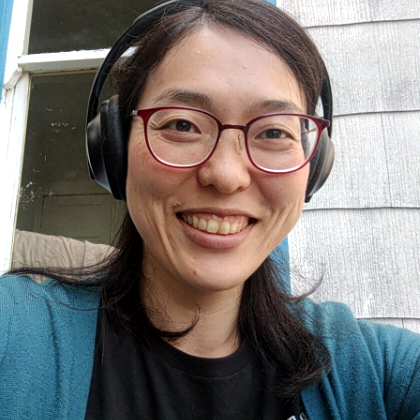
Please continue watching videos with the below link. While watching, you also can practice speaking skills with scripts.
Our latest lesson will be updated here on Twitch as well as YouTube Playlist!

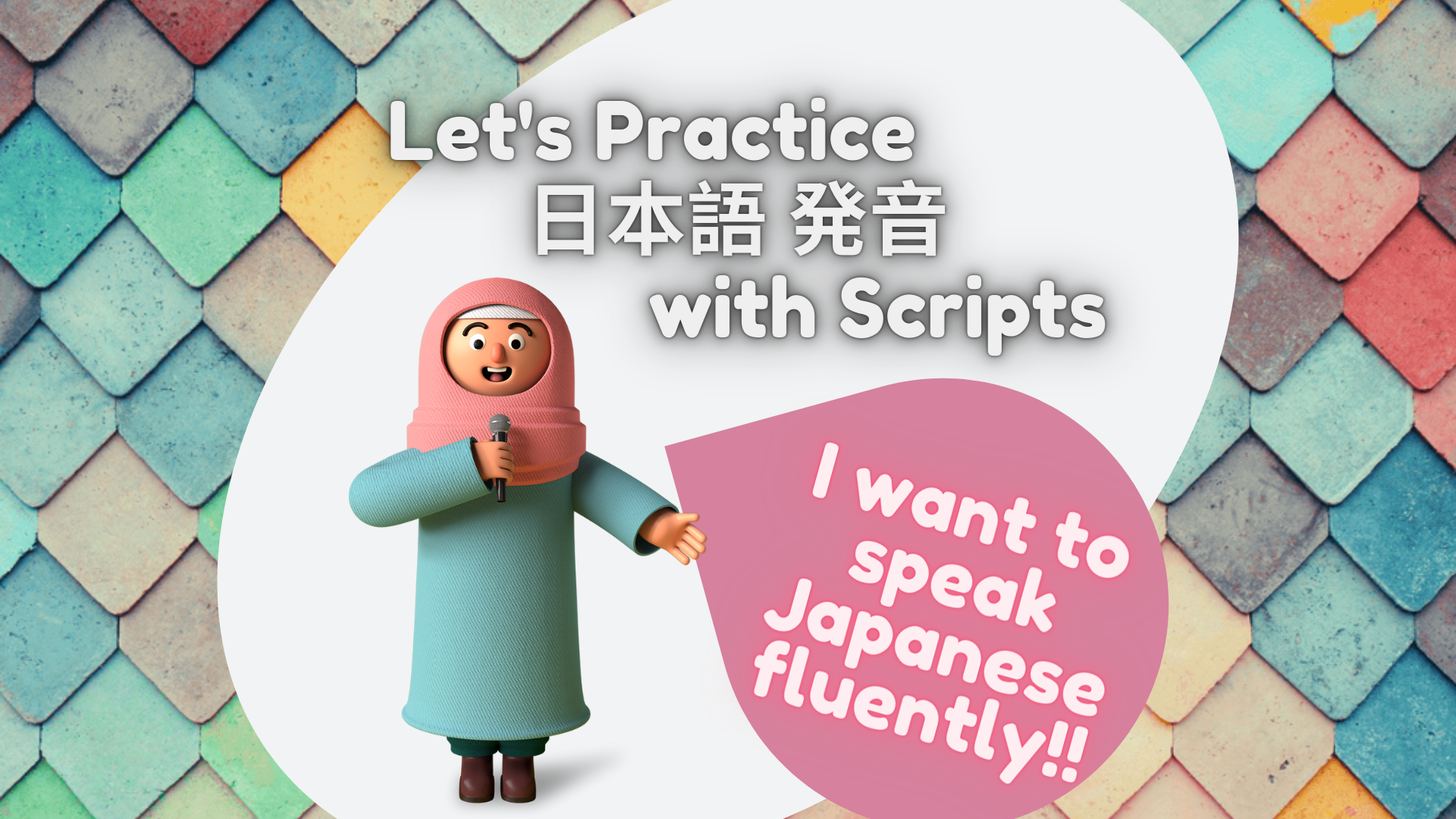

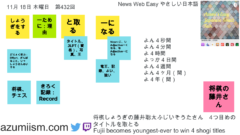
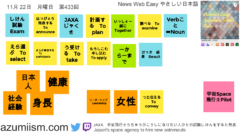
コメント